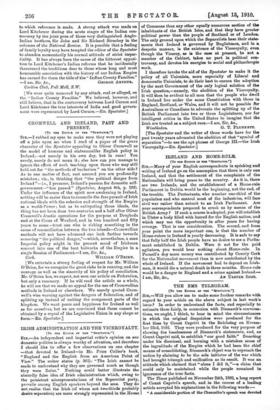IRISH ADMINISTRATION AND THE VICEROYALTY.
[To THE EDITOR OF Tlia " SPECTATCS.."1 Ste,—An independent and impartial critic's opinion on our domestic politics is always worthy of attention, and therefore I should like to offer a few observations on one chapter —that devoted to Ireland—in Mr. Price Collier's book, "England and the English from an American Point of View." The writer states (p. 303): "The Irish cannot be made to understand why they are governed much as though they were Zulus." Nothing eould better illustrate the absurdly false idea of Irish administration which, owing to the persistent misrepresenta.tions of the Separatist party, prevails among English speakers beyond the seas. They do not realise that the Irish (of whom not two-thirds probably desire separation) are more strongly represented in the House of Commons than any other equally numerous section of the inhabitants of the British Isles, and that they have greater political power than the people of Scotland or of London. The only ground upon which the Separatists base their state- ments that Ireland is governed by Englishmen, and in a despotic manner, is the existence of the Viceroyalty, even though the Viceroy, as is the ease at present, be not a member of the Cabinet, takes no part in political con- troversy, and devotes his energies to social and philaaathropio work.
I therefore invoke the aid of the Spectator to make it the policy of all Unionists, more especially of Liberal and democratic Unionists, to do their best to ensure the adoption by the next Government of the only logical solution of the Irish question,—namely, the abolition of the Vkeroyalty. It will then be evident to all men that the people who dwell in Ireland live under the same Constitution with those in England, Scotland, or Wales, and it will not be possible fbr Australians or Canadians to advocate the splitting up of the British Parliament into two or three Legislatures, nor for intelligent critics in the United States to imagine that the Irish are treated as a subject race.—I am, Sir, &e., [The Spectator and the writer of these words have for the past twenty years advocated the abolition of that "symbol of separation "—to use the apt phrase of George I11.—the Irish Viceroyalty.—En. Spectator.]






































 Previous page
Previous page